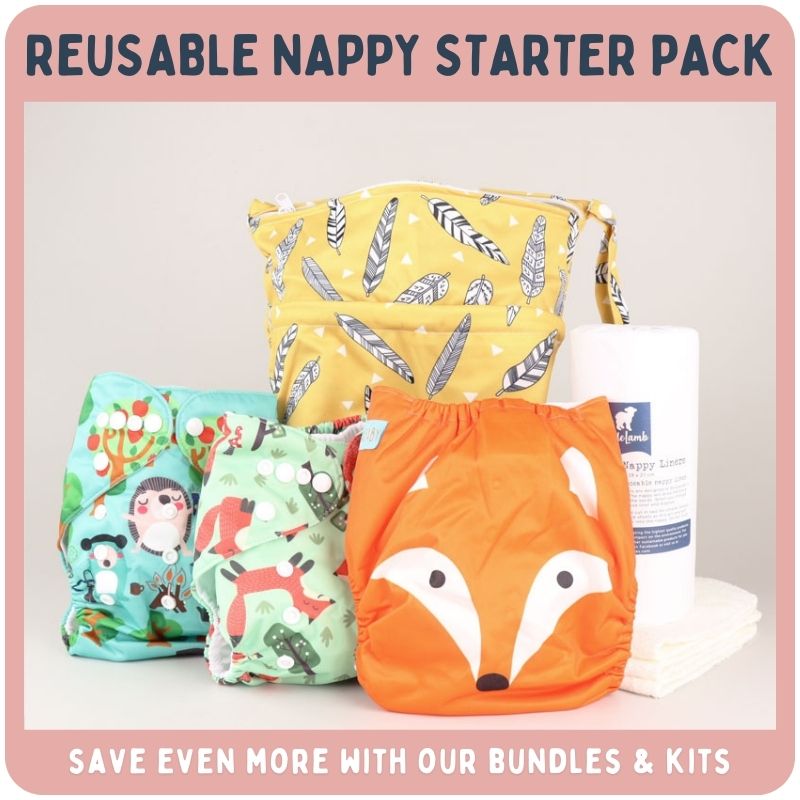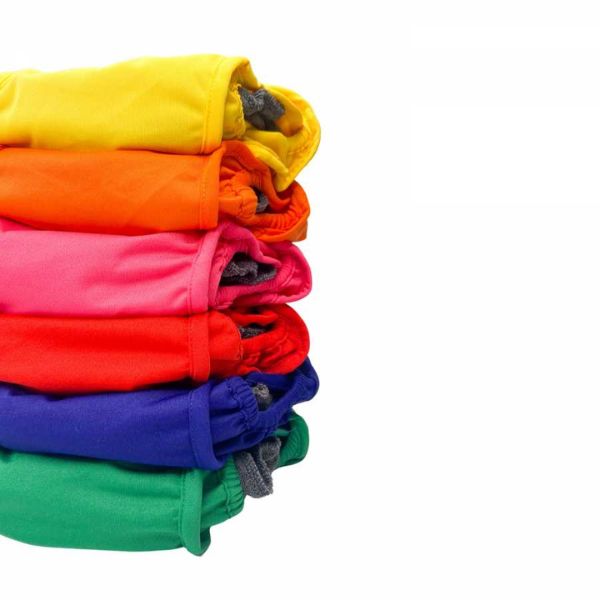The Great Big Nappy Census reveals the impact of cost of living on sustainability
The cost of living crisis is probably the most defining issues of of 2022, that won't be remember fondly by anyone. From soaring energy bills, rising food prices, and a crash in the value of the pound, the British people are struggling to keep up with a volatile economic environment.
With this in mind, our Great Big Nappy Census for 2022 has taken an look at the impacts this crisis has had on lifestyle and sustainable parenting so we can find out more about how parents are prioritising their expenditure, and where they are seeking to save some pennes.
For this year’s Great Big Nappy Census, we surveyed over 1,800 parents to delve into parents choices surrounding nappies, wipes and perspectives on sustainability.
Polling parents who only use reusable nappies, those who only use disposable nappies and parents who use a mix of both products, we can reveal what parents in the UK had to say about their nappy usage:
Disposable nappy users
According to our insight, almost two-thirds of disposable nappy users (59%) are aged 25 to 34 years old, with the majority located in London (13%).
When asked about what has stopped them from using a reusable nappy option, the top reason disposable nappy users gave was the washing (73%), followed by the perception they seem complicated (38%), the initial money outlay involving in buying reusable nappies (31%) concerns over the bulkiness of the nappy (24%) and whether they would able to use reusable nappies with childcare providers (20%).
However, even though disposable nappy users are hesitant to make the switch, 71% say they would consider making the sustainable switch if they were supported in the process. Our Great Big Nappy Census revealed the top ten factors that disposable nappy users would find helpful in encouraging parents like them to choose cloth nappies over disposables:
.jpg)
Free samples - 57%
Incentive vouchers - 47%
Local nappy laundry services - 37%
Recommendations by healthcare professionals - 35%
Better access in high street stores/supermarkets - 33%
Local nappy lending kits - 21%
Peer support - 19%
TV advertising - 11%
Social media influencers - 7%
Celebrity endorsements - 3%
These figures closely mirror those found in previous years, with free samples and incentive vouchers topping the bill of sources of encouragment to give reusable nappies a go. In the industry, we are asked for samples fairyl regularly, and suggestions are made to see reusable nappies included in new parent packs such as Bounty. Of course, the challenge with providing samples is that the nature of the product does not substantiate that. Unlike disposable nappies, which are a throwaway item costing pennies to produce, reusable nappies are a long-term, built to last reusable product, that comes at a much higher production cost. This makes it unsuitable for this kind of marketing activity.
It is interesting to see that generalised marketing activities such as advertising, celebrity endorsement and social media influencer promotion are at the bottom of the list, suggesting that parents want to see honest, real-life perspectives and information surrounding reusable nappies, rather than promotional activity.
Delving into the potential savings of eco-parenting decisions, disposable nappy only users (13%) told us they spend over £20 every week on disposable nappies. With the average infant using nappies for 3.5 years, parents could be literally throwing away over £3500 during infancy and sending the single-use plastic waste to landfill.
Reusable nappy only users
This year we examined the impact of rising energy costs on reusable nappy usage. We anticipated that we would see impacts in the way that people are using their nappies, and that people were concerned about the washing costs.
Results indicated that 58% of reusable nappy users are doing so primarily for the cost saving benefits. This is up from 50% in 2021, and is representative of the fact that the UK public are seeking ways to cut costs where possible. We also found that 75% of reusable nappy users have not reconsidered their use of reusable nappies, despite the rise in energy costs. This does of course mean that 25% of respondents in fact had reconsidered using reusable nappies, which is disappointing when you consider that these are parents who have already invested in their reusable nappies, have them on hand, and yet are still apprenhensive to use them due to washing costs.
Over the past few months, we have seen incremental rises in disposable nappy costs, with packs edging up in price, and packs sizes becoming smaller. This is absolutely to be expected given the fact that the 2 primary costs involved in disposable nappy manufacture are oil, and electric energy. The majority of our disposable nappy using respondents were using Pampers nappies, and a price analysis conducted by The Nappy Alliance and The Nappy Gurus has found that the price of Pampers nappies has increased by 19.8% in the period between April and November 2022. We are anticipating further increases imminently as the sharp increase in production costs begins to filter through to the large scale distribution cycle.
.jpg)
Despite the concerns surrounding energy bills and home laundering, 53% of families report that they are using more reusable products since the start of the cost of living crisis, which is a positive outlook for sustainability. We have also found that 63% of families are buying more second hand items, and the popularity of pre-loved fashion, having received credibility boosts from mainstream sources such as Love Island, is reflective of that.
Becoming a parent can stretch a family's finances, but finding cheaper alternatives to parenting could massively reduce the cost of bringing up a child. The Great Big Nappy Census 2021 reveals that 66% of reusable nappy users are spending less than £300 on their reusable nappies and accessories, with an increase from 26% to 32% of parents using reusable nappies straight from birth. With these nappies taking a family right the way through infancy (and beyond if used on a second child, or sold as preloved) this is a great way to cut out those weekly expenses on disposable nappies and wipes.
Before these families started using reusable nappies, a third (36%) were concerned about how they would wash them effectively. However, with these parents utilising Facebook groups (58%), nappy advice questionnaires (50%), Instagram (39%), and Youtube (26%), they were able to gather insight on how to best wash their reusable nappies and therefore felt confident in making the eco-friendly switch.
If you are hesitant to switch to cloth nappies, we encourage parents to think not only about the environmental impact disposables have but about the cost-saving element of making the switch too. Becoming a parent can stretch a family's finances, but finding cheaper alternatives to parenting could massively reduce the cost of bringing up a child.
Supporting families to choose sustainable nappies
Despite our focus currently being on the cost of living, it is important that we don't neglect the ever growing issue of climiate change and the concerning figures that are emerging. Choosing sustainable nappies and wipes is an easy way to lower our carbon footprint, and generate significantly less household waste. Although the rise in energy costs does make the monetary savings involved in choosing reusable nappies less substantial, are parents using that as a justification for not opting for sustainable choices? Is it a case of an alleviated environmental-guilt-factor in the form of "well I would have used reusable nappies but the cost of electricity meant I couldn't"? Only the individuals involved can answer that question, but it is important that we continue to make the effort to make these eco-conscious parenting choices, the planet can not afford for us not to. With the average daily plastic consumption of single-use nappies equivalent to throwing away seven supermarket plastic carrier bags per day per person, parents in the UK must keep at their sustainable efforts in order to make a positive impact. We await the publication of the updated Life Cycle Analysis (LCA) report which has examined the environmental impact of both disposable and reusable nappies, which we have on good authority that shows a clear win for reusable options.
Our data from The Great Big Nappy Census 2022 shows that parents would be encouraged to try reusable nappies if their local council offered a nappy incentive scheme (86%), but that the council authorities of 53% of parents did not offer such a scheme, and 22% of repondents did not know if there was a scheme available in their area. Suggesting that where schemes are available, they are perhaps not promoted effectively. You can see if your local council currently offers a nappy incentive by checking our list of schemes here.
We also know that 96% of parents would be supportive of a Government backed national reusable nappy scheme. This is something that we would of course love to see, and continue to work on via our involvement with the Nappy Alliance. However, with the current political turmoil, this is not something that will be a priority for parliament members at the present time, which is a shame.
If you are interested in giving reusable nappies a try, you can explore some of our budget-friendly, and risk free trial options below:
For more reusable cloth nappy tips and advice, please visit: https://www.thenappygurus.com/help.html
Other findings
In the census we also explored the topics of wipes and periodwear. Results have found that of those who are currently using disposable wipes, 78% had in fact considered a reusable wipe option. They were deterred by concerns over washing (37%), a lack of awareness or confusion over the different types (28%) and the price (15%). The latter is interesting as we know that reusable wipes are such a hugely cost effective solution. 46% of the disposable wipe census respondents were using supermarket own brand wipes. Based on using an average of 3 wipes per nappy change for 3 years, this would incur an average cost of £265. On that same basis, the 24% of respondents using Water Wipes are stacking up a whopping £1226 in expenditure. Of course, when it is £5 here or £10 you're not always conscious of it, but it really does add up. On the contrary, a pack of reusable wipes can be purchased for under £10, and our Reusable Wipes Starter Pack, including everything you need, is just £24.95.
In the realm of periodwear, we saw our biggest data shift here from the 2021 results. The use of Period Underwear is up from 26% to 37% in 2022, which is reflective of their more mainstream presence, having been featured in stores such as Primark. This is great news for the sustainability sector, and we hope it having a notable positive impact on the amount of single-use plastic period waste being disposed of in the UK.
If you would like to learn more about these data results, or get in touch please contact us



